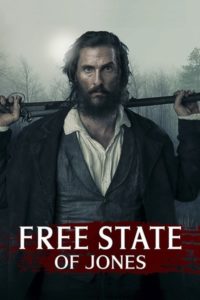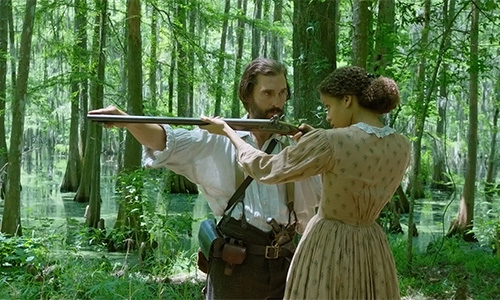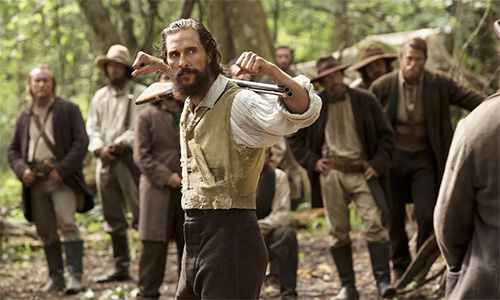 With his scraggly beard, yellow teeth, foreboding scowl, and deliberate limp, Matthew McConaughey’s (Amistad, A Time to Kill) portrayal of Newt Knight, a poor white farmer who led an extraordinary rebellion during the Civil War, is a far cry from the same man who was pigeonholing his career a decade earlier by playing the same character over and over in hit or miss romantic comedies like How to Lose a Guy in 10 Days, Failure to Launch, The Wedding Planner, Fool’s Gold, and The Ghosts of Girlfriends Past to name a few. McConaughey reinvented himself three or four years ago and re-established himself as a dramatic leading man with the likes of The Lincoln Lawyer, Interstellar, HBO’s True Detective, Killer Joe, Mud, and Dallas Buyer’s Club, for which he won Best Performance by an Actor in a Leading Role at the 2014 Academy Awards ceremony. While he’s had his misses recently (has anyone even heard of 2016’s The Sea of Trees?), he has continued to have the ability to pick and choose his movies, and, unlike his string of romantic comedies, he continues to branch himself out further and further.
With his scraggly beard, yellow teeth, foreboding scowl, and deliberate limp, Matthew McConaughey’s (Amistad, A Time to Kill) portrayal of Newt Knight, a poor white farmer who led an extraordinary rebellion during the Civil War, is a far cry from the same man who was pigeonholing his career a decade earlier by playing the same character over and over in hit or miss romantic comedies like How to Lose a Guy in 10 Days, Failure to Launch, The Wedding Planner, Fool’s Gold, and The Ghosts of Girlfriends Past to name a few. McConaughey reinvented himself three or four years ago and re-established himself as a dramatic leading man with the likes of The Lincoln Lawyer, Interstellar, HBO’s True Detective, Killer Joe, Mud, and Dallas Buyer’s Club, for which he won Best Performance by an Actor in a Leading Role at the 2014 Academy Awards ceremony. While he’s had his misses recently (has anyone even heard of 2016’s The Sea of Trees?), he has continued to have the ability to pick and choose his movies, and, unlike his string of romantic comedies, he continues to branch himself out further and further.
In Gary Ross’s (Pleasantville, Seabiscuit) Free State of Jones, McConaughey looks very far removed from the sculpted hunk, showing up shirtless at some point in every single one of his movies while also being named People Magazine‘s 2005 Sexiest Man of the Year. Whether you are more attracted to McConaughey or his wife Serena (Keri Russell – FX’s The Americans, Waitress), there is nothing sexy about this movie. Though the story is fiction, Free State of Jones is based on the history of Jones County during and immediately after the American Civil War. Newt Knight is an American farmer living in Mississippi who reluctantly becomes a soldier. However, he is far more interested in saving his fellow fighters as a battlefield medic than fighting the Union. He questions the legitimacy of the war, especially when learning of The Twenty Negro Law, which stated that exempted from Confederate military service, one white male for every twenty enslaved persons owned on a Confederate plantation.
Ahead of his peers who believed in the nobility of fighting for the South, Newt tried to be the voice of reason to whoever would listen, saying that they were fighting a war for the rich enslavers who were not even involved in the war. When his nephew Daniel (Jacob Lofland – Mud, FX’s Justified) is killed, seemingly moments after being drafted to the Confederacy, it’s the final straw for Newt. He deserts his unit to take his nephew home for a proper burial. He has no plans of returning to a war he does not believe in.
Newt isn’t exactly hiding. He knows the desertion punishment can range from an arrest to death, yet he doesn’t back down when Confederate soldiers show up on his land. During the Civil War, the Confederacy had implemented a tax-in-kind system that allowed soldiers to raid people’s homesteads and take whatever they wanted in the name of the war effort, often leaving the families starving. The movie’s main antagonist is Lieutenant Barbour (Bill Tangradi – Argo, FX’s Justified). A soldier himself, but not one who was fighting in the war, Barbour’s job was to enforce that tax-in-kind system. Traveling from farm to farm with three fellow soldiers, Barbour took what he wanted (most often food, livestock, and clothing) in the name of the Confederacy. Unfortunately, Barbour and men like him took what they wanted from the defenseless women and children. Newt taught the women to defend themselves with guns and, in doing so, developed his battle with Barbour.

Newt and wife Serena enlist the help of Rachel (Gugu Mbatha-Raw – Concussion, Larry Crowne), an enslaved person of a nearby plantation, who helps cure their ailing newborn with an herbal remedy and who then becomes an ally to the couple. After Newt’s stand with Barbour, it becomes clear that he can no longer hide at home. Rachel helps him escape to a nearby swamp, where he joins a small band of runaway enslaved persons in virtually impenetrable territory to those unfamiliar with the area. He quickly establishes a friendship with Moses (Mahershala Ali – The Curious Case of Benjamin Button, The Place Beyond the Pines), the group leader. Soon, these fugitives are joined by other runaway enslaved people and Confederate deserters, and before he knows it, Newt has a group of rebels and plenty of weapons. Their goal is not to join the North exactly but to attack the Confederate Army alone. Fighting a war that they don’t believe in for a group of wealthy plantation owners who aren’t even getting their hands dirty, coupled with the fact that their homes are being raided by soldiers who are abusing the tax-in-kind system, fuels their motivation. Rachel becomes one of our favorite characters in the movie because of her selflessness and fearlessness. Unfortunately, the film also alludes that her enslaver abused her sexually, making him just as vile of an antagonist as Lieutenant Barbour or his superior, the Confederate Commander Elias Wood (Thomas Francis Murphy – 12 Years a Slave, Terminator Genisys).
While this part of the story is pretty straightforward and easy to follow, a second story in 1949 involves a white man on trial. His crime? He is 1/8th African American, and he married a white woman. This is illegal in Mississippi, and he’s being told to annul his marriage. We go back and forth with this story, but it’s not introduced when you think it should be. And we go back to this court scene at very infrequent intervals. It also feels really out of place at the beginning, but it makes sense as the movie progresses and picks up steam at the end. Also, for whatever reason, Ross feels he needs to give us periodic updates about the other happenings in the war. It was almost as if he thought he needed to educate us because most of his updates had nothing to do with what was happening in the movie. It was more about letting us know what was happening in other parts of the country simultaneously with his story. But, just like with the transitions to the 1949 court case, this frequency is inconsistent. We get almost known of these at the beginning, but a ton of them at the end. I learned nothing from these except for the fact that slavery continued to occur in the South even after the Emancipation Proclamation, masquerading itself as an apprenticeship program.
I could mention more about this movie’s plot, but I don’t want to give away any spoilers. I’m sorry if I gave some away already. I attempted to be vague. This brings up a good time in this review to mention numerous similarities between Free State of Jones and 2000s The Patriot with Mel Gibson. While The Patriot was based upon the Revolutionary War, you still had its star oppose participating in the conflict. You also had disgruntled leaders in Newt Knight and Benjamin Martin, who spearheaded a group of strangers who believed in the exact cause and who unlawfully started a rebellion. There was one main adversary that each movie’s star seemed to have a personal feud with. In Free State of Jones, Lieutenant Barbour almost comes across as a saint when you compare him against Col. William Tavington (Jason Isaacs), the primary foe in The Patriot.

You had the burning of churches, the locals who gathered the courage to stand up for themselves, and the brutal deaths of some of your favorite characters. But I wasn’t nearly as moved passionately watching Free State of Jones as I was The Patriot. Gibson’s portrayal of Martin was one with more emotion. McConaughey depicted Newt, who, for the most part, acted on ration more than rage, despair, or empathy. And that’s not to say McConaughey did a poor job. Newt Knight was just a different man than Benjamin Martin. While Benjamin Martin was an entirely fictional character composed of four people during the Revolutionary War. After researching, I learned Newt might not have been the classy and markedly man he portrayed. After seeing Free State of Jones (and I hope you do), I encourage you to check out Free State of Jones vs. the True Story of Newton Knight/ which lists which parts of the story were fictional and which were based more soundly on fact. Just like with any movie, you want the story to be 100% factual, but that’s not always the case because often it can blur the goals for the movie, or it might make the film less dramatic, or there isn’t enough recorded documentation to verify if the entire story is true. Regardless of the fact, I felt that Free State of Jones took me down a path of history that I knew nothing about, and for that, I was grateful.
Was the movie as good as I wanted it to be? No, it was not. I wanted it to be awesome after first seeing the trailers. But it is better than the 43% cumulative score that Rotten Tomatoes gives. It does lack structure and consistency. It gives us a false finish because he wanted to tell more of the story than the movie probably had time for. While the last 40 minutes or so were just as important as the first hour and a half plus, it felt fragmented. It’s almost as if Ross refused to stop even when logic said it should and then gave us a minute to read about what happened after the fighting ended. Did we need the scenes from 1949? No, not really. Just like the rest of the movie, I found myself surprisingly unattached. This resulted in a lower score than what it might have deserved. More importantly, I’m likely to forget about this movie compared to a similar movie in which I felt emotionally invested. So, I do recommend this movie. It’s worth the watch, and you’ll get more out of it if you see it on the big screen. Most people will likely like it, but few will love it.
Plot 8/10
Character Development 8/10
Character Chemistry 7.5/10
Acting 7/10
Screenplay 7/10 (The first two-thirds were brilliant; the last third saw this movie trying to evolve into a completely different film. While that story was important, it felt disconnected from the rest of the movie)
Directing 7/10 (Ross needed to tighten this up some for it to have the cohesive flow that he worked hard to establish early on)
Cinematography 9/10
Sound 8/10 (subdued and effective)
Hook and Reel 7.5/10 (the 2 hours 20 minute run time wasn’t the problem as much as it was that there were an additional 30-40 minutes tacked on to this movie when you anticipated it being over)
Universal Relevance 9/10 (an important story to tell, even if the story was fiction and even if we only were presented with one side, the hero side, of Newton Knight)
78%
B-
Movies You Might Like If You Liked This Movie
- Amistad
- 12 Years a Slave
- Harriet
- The Birth of a Nation
- The Patriot